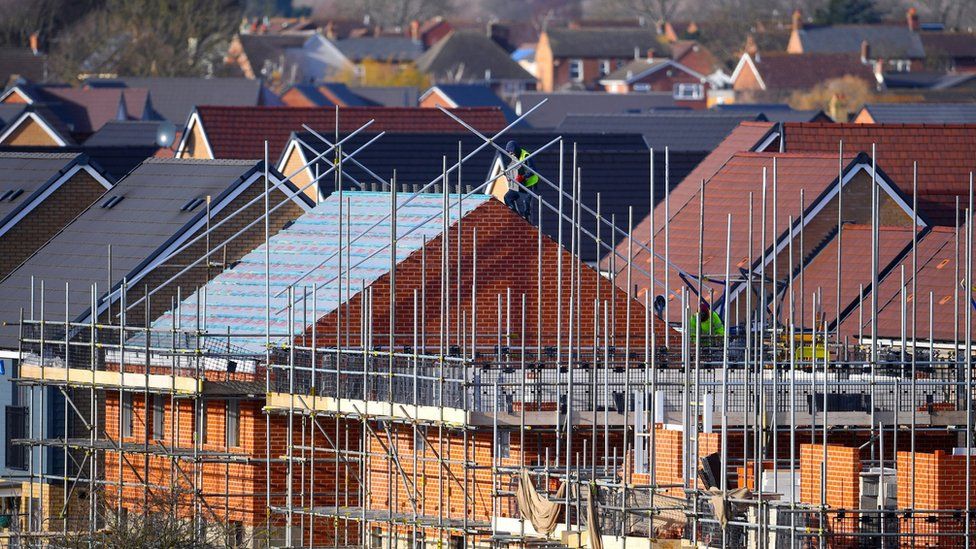Is the housing secretary right about how long planning permission takes?
- Published

The claim: A standard housing development takes an average of five years to go through the planning system.
Verdict: Developments of more than 1,000 dwellings may take that long, but those are very large. The vast majority of developments are much smaller and do not take that long.
Robert Jenrick, secretary of state for housing, communities and local government, wrote an article in the Sunday Telegraph talking about how he wants to change the planning system in England.
In the article, he wrote: "Under the current system, it takes an average of five years for a standard housing development to go through the planning system - before a spade is even in the ground."
The Reality Check team asked his department where this figure came from and was pointed towards a chart in the Letwin Review from 2018, which looked at why it takes so long to complete large housing projects.
The chart features 15 housing developments together with how long they took to get planning permission.
When you add up how long they each took and divide by the number of developments, you do indeed get about five, even though only five of them took five years or longer.
The 8,861 unit Barking Riverside development takes up the average considerably - its planning process took 12.5 years.
The development of the site of the Barking power station was originally supposed to be supported by an extension of the Docklands Light Railway but will now be served by a London Overground Station.
It needed other transport links including roads, as well as schools, utilities and community facilities.
Mr Jenrick did not give a definition of a standard housing development, but according to research from the estate agents Savills. around 65% of homes given consent are on sites of fewer than 100 units.
There is also no legal definition of a standard development, although any development with more than 10 dwellings is counted as a major residential development.
The smallest one in the selection of 15 used to reach the five-year average is the 1,187 unit Trumpington Meadows development in Cambridge. The largest is the 15,737 unit development in North Greenwich. So they do seem to be very large developments rather than what might be deemed standard.
"It is an easy throwaway comment and will be true in some cases," said Tony Mulhall, planning expert at the Royal Institution of Chartered Surveyors.
"Most of the applications being referred to will have gone to appeal or perhaps judicial review."
The property consultancy Lichfields did some similar research into how long the planning process took for different-sized developments.

It found that the process takes longer the bigger the development, which is no great surprise.
The bigger the development, the more factors need to be dealt with such as water, electricity, roads and services such as GP surgeries and schools.
The average length of time for planning doesn't get close to five years until you start looking at developments of more than 1,000 units.
The government has already had a review of planning appeals, led by Bridget Rosewell. She said: "At present, the inquiry process takes nearly a year to complete from lodging the appeal to a decision for inspector decided cases."
"This is just too long." She suggested that this part of the process could be reduced to six months reasonably easily.
The government publishes statistics on how long planning decisions by district level planning authorities in England have been taking. (The vast majority of residential planning decisions are taken at this level, although the secretary of state and Mayor of London might also get involved.)
The latest figures show that 89% of major applications were decided "within 13 weeks or the agreed time" (planning departments and developers may agree an extension to the 13 week time limit).
So while the biggest developments may indeed average five years for planning, that isn't the case for most projects.